Arts & Entertainment
Best of Gay D.C. 2016: PEOPLE
Blade readers voted for their favorite people
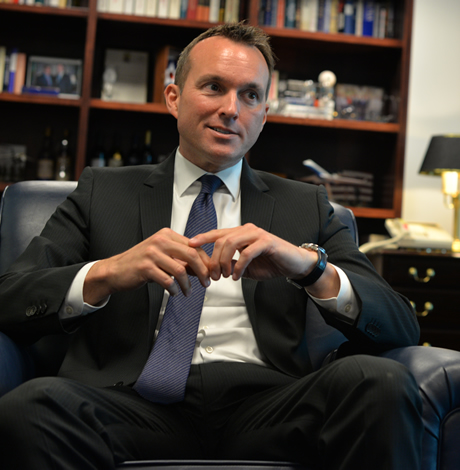
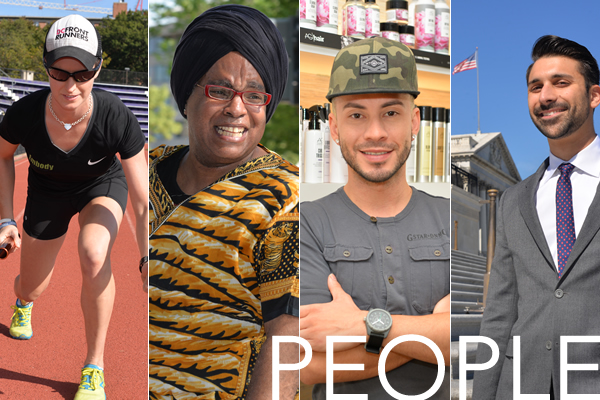 Local Hero
Local Hero
Eric Fanning, U.S. Army Secretary
President Obama has appointed a record number of openly LGBT people to his administration, but over the course of the last year none has received as much attention as Army Secretary Eric Fanning.
His approval by the U.S. Senate in May after a nearly yearlong process in which his confirmation was in question made him the first openly gay person confirmed to head a military service branch.
Since that time, Fanning has become a hero in the LGBT community and a favorite interview subject for the media.
In an interview with the Blade in August, Fanning said he’s aware of his fan base, which he said has grown with each advancement of his career at the Pentagon.
“I always think I’m prepared and then the wave comes when you’re nominated, when you’re confirmed, when you’re sworn in,” Fanning said. “There’s always something that’s a hook that gets a little bit of attention.”
Over the course of the Obama administration, Fanning has occupied a position in each of the military services. Before his confirmation as Army secretary, Fanning held the posts of Air Force under secretary and deputy secretary at the Navy. Fanning was also chief of staff to Defense Secretary Ashton Carter and served as acting Army secretary, but had to relinquish the job briefly to win confirmation.
No stranger to LGBT advocacy, Fanning was once a board member for the Gay & Lesbian Victory Fund. He began his tenure in the Obama administration at the time Congress repealed “Don’t Ask, Don’t Tell.”
In 2013, Fanning became the first senior defense official to endorse a non-discrimination rule for sexual orientation in the military and openly transgender service in the armed forces. The U.S. military has since adopted both ideas.
Fanning said in August the changes have been great for him to witness personally, but “far more important, I think, it’s been great for the U.S. military.”
“Opening up service to people who haven’t had the opportunities, but meet the requirements, means we can recruit from a broader pool of talent and get the best our country has to offer,” Fanning said. (Chris Johnson)
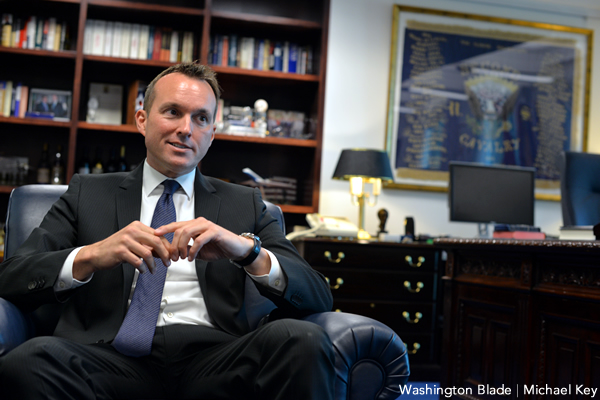
Army Secretary Eric Fanning (Washington Blade photo by Michael Key)
Best Amateur Athlete/Best Fitness Instructor
Grace Thompson, D.C. Front Runners
Runner-up: Mark Hofberg, D.C. Gay Flag Football
Runner-up (fitness instructor): Kyle Suib
Grace Thompson calls the D.C. Front Runners “welcoming, supportive and friendly.”
The D.C. native joined the group seven years ago and is one of between 15-20 women in the league.
“Our group is dynamic with a full spectrum of runners, from the sub three-hour marathon to walkers and every pace in between.”
Thompson, a lesbian, started running consistently about 10 years ago. Since then, she’s run five full marathons and four half marathons. On Oct. 30, she’ll add another to the list — the Marine Corps Marathon.
“I’m honored, surprised and thankful to win,” Thompson, who works by day as the owner of Embody Pure Fitness, says. “I honestly didn’t campaign at all. It was a surprise to me that I was even nominated.” (Joey DiGuglielmo)
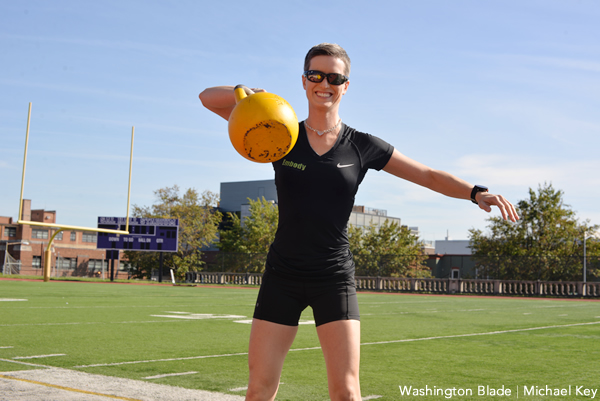
Grace Thompson (Washington Blade photo by Michael Key)
Best Artist
John Jack Gallagher
Runner-up: Denis Largeron
John Jack Gallagher has been taking photos since his first boyfriend gave him a 35-millimeter camera for his birthday more than 30 years ago. In 2012, he started shooting professionally after members of the Stonewall Kickball team he’d been photographing insisted he shoot their wedding.
“I created a Facebook page and started getting a lot of likes and even some clients,” Gallagher, 57, says. “My friends ended up eloping so I did not get to photograph their wedding, but by then, John Jack Photography was started down the road to being a permanent thing.”
Gallagher shoots fundraisers, weddings and sports and says he’s working more hours than he ever has before. “But I love it,” he says. He aims for “colorful, candid and emotional” photos.
“I like my photos to be vibrant and tell a story, even when they capture a single moment,” he says.
Gallagher is single and has been traveling all over the East Coast to build his business.
He’s also learned to be more careful after getting banned from Facebook five years ago for accidentally posting a photo of a woman whose bathing suit had slipped during a Jello wrestling match. (Joey DiGuglielmo)
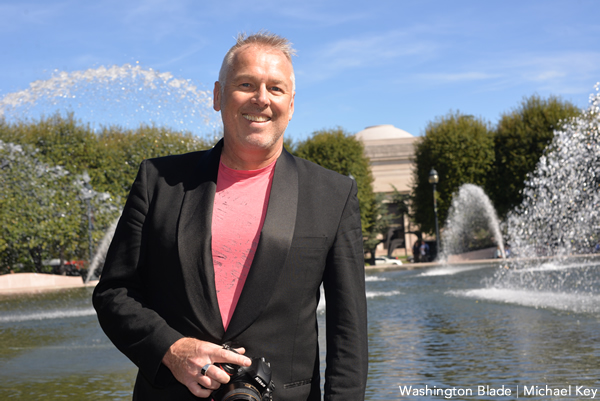
John Jack Gallagher (Washington Blade photo by Michael Key)
Best Businessperson
Jim ‘Chachi’ Boyle
Town, Trade and Number Nine
Runner-up: Dr. Gregory Jones, Capital Center for Psychotherapy & Wellness
Jim “Chachi” Boyle has been involved in various nightlife ventures for 20 years. A decade ago he became business partners with John Guggenmos and Ed Bailey, the visionaries behind Town Danceboutique, Trade and Number Nine.
“It’s an honor to be recognized,” Boyle says. “My partners and I are fortunate to have amazing managers, awesome staffs and great customers.”
Boyle lives in Shaw. Town Danceboutique has won dozens of Washington Blade Best of Gay D.C. awards since it opened in 2007. (Joey DiGuglielmo)
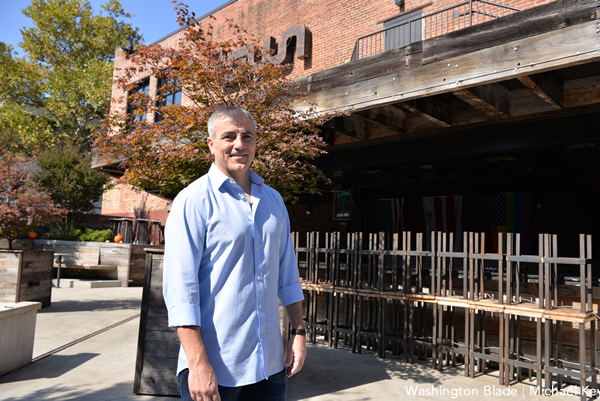
Jim ‘Chachi’ Boyle (Washington Blade photo by Michael Key)
Best Clergy
Rayceen Pendarvis
Runner-up: Bishop Allyson Abrams
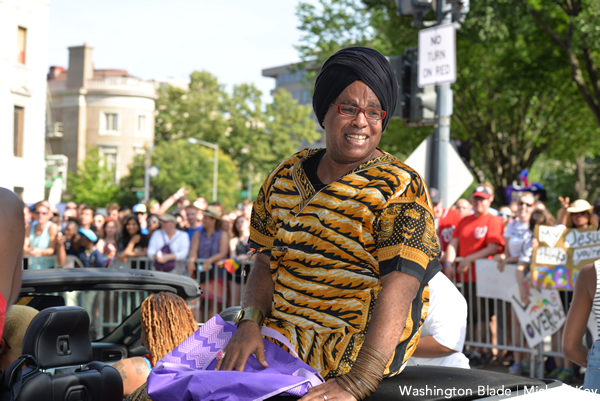
Racine Pendarvis (Washington Blade photo by Michael Key)
Most Committed Activist
Earl Fowlkes
Runner-up: Sarah McBride
Those who know Earl Fowlkes know the path he has taken over the past 30 years from an AIDS and gay rights activist in New York City and D.C. to his current role as leader of three prominent LGBT-related organizations and chair of the D.C. Commission on Human Rights. He epitomizes the term “committed activist.”
Fowlkes served as a volunteer with various AIDS organizations in New York City and New Jersey during the early years of the AIDS epidemic in the 1980s and early 1990s. In 1996, he moved to D.C. to take a job as executive director of Damien Ministries, a faith-based group that provides services to people with HIV/AIDS.
In 1999, he became one of the founders of the organization that expanded D.C.’s Black Pride celebration into a national federation that quickly evolved into the International Federation of Black Prides, which helped coordinate black LGBT Pride events worldwide.
While serving as its CEO and president, Fowlkes played a key role in 2012 in expanding the organization’s mission to take on black LGBT-related economic, social and health issues along with a change of its name to the Center for Black Equity.
In keeping with his interest in politics as a means of achieving social change, Fowlkes was elected chair of the Democratic National Committee’s LGBT Caucus in August 2013 shortly after being appointed as a member of the DNC. In November 2014, Fowlkes won election as president of D.C.’s Gertrude Stein Democratic Club, the city’s largest local LGBT political organization.
As if this were not enough, the D.C. City Council in July 2015 confirmed Fowlkes’ nomination by Mayor Muriel Bowser to become chair of the D.C. Commission on Human Rights. The independent commission is charged with adjudicating discrimination cases under the city’s Human Rights Act, which bans discrimination, among other categories, based on sexual orientation and gender identity.
“One thing led to another,” said Fowlkes in discussing his activist endeavors. “It’s the most humbling thing that’s ever happened to me and I’m so immensely proud to have this honor.” (Lou Chibbaro Jr.)
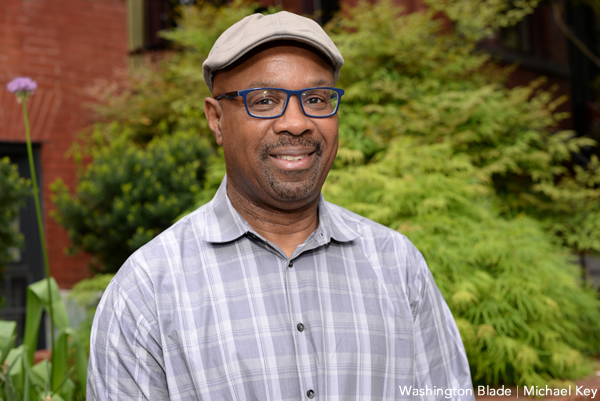
Earl Fowlkes (Washington Blade photo by Michael Key)
Best Council Member
David Grosso
Runner-up: Jack Evans
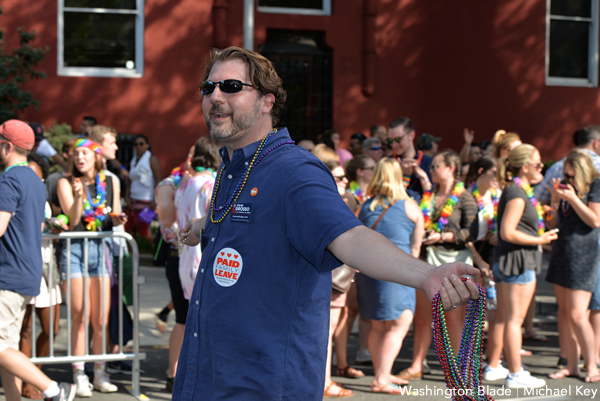
D.C. Council member David Grosso (I-At-Large) (Washington Blade photo by Michael Key)
Most LGBT activists who know Council member David Grosso (I-At-Large) say he began with a running start in his support for LGBT issues during his first year on the Council in 2013 and hasn’t stopped since then.
“He has an extensive record of supporting LGBT concerns, including introduction and passage of bills to prevent youth suicide and to require LGBT cultural competency for medical professionals,” according to the Gay and Lesbian Activists Alliance, which gave Grosso its highest rating of +10 for D.C. Council candidates running in the Nov. 8 election.
During his first term in office, Grosso has introduced, co-introduced or co-sponsored at least a dozen bills that directly or indirectly benefit LGBT people.
Among them is the Youth Suicide Prevention and School Climate Survey Amendment Act of 2015, a first of its kind measure that specifically lists “LGBTQ youth” as an at-risk subgroup requiring careful attention in school suicide prevention programs.
Other bills that Grosso introduced or co-introduced include the LGBTQ Cultural Competency Continuing Education Amendment Act of 2015, which requires all medical professionals to take LGBTQ cultural competency training to maintain their licenses; a bill banning co-called “conversion therapy” for minors; and a measure requiring the city to provide new birth certificates to transgender people to reflect their correct name and gender.
Grosso has attended meetings of LGBT organizations has appeared at numerous LGBT events, including the Capital Pride Parade, AIDS Walk Washington, D.C. Black Pride and the D.C. LGBT Center annual reception.
“As an at-large Council member I work every day to ensure that our city welcomes, embraces and respects the human rights of every person,” he wrote in his response to GLAA’s candidate questionnaire. “This commitment to inclusion is reflected in my staff that includes several individuals who live openly as members of the LGBTQ community.” (Lou Chibbaro, Jr.)
Best Hill Staffer
John Assini
Runner-up: Evan Dorner
For John Assini, public service has been a calling he has felt since his youth and one he now answers as legislative correspondent to Sen. Tammy Baldwin (D-Wis.).
“When I was young, it was instilled in me to fight for my beliefs,” Assini said. “Working on the Hill allows me to do that every day. Working for passionate members of Congress over the last five years has allowed me to contribute in a small way to the national conversation, which has been a humbling experience.”
Assini, 27, has already built a substantial resume since he began his career on Capitol Hill in 2011. Before working for Baldwin, he was a legislative aide for the U.S. Senate Committee on Energy & Natural Resources and an intern for now-Sen. Martin Heinrich (D-N.M.). Between 2012 and 2014, Assini was also a board member for GLASS, the affinity group for LGBT Senate staffers.
But Assini feels especially honored to work for Baldwin, whom he calls a “dedicated and thoughtful member who continues to work tirelessly on behalf of her state and its residents, and who shares my values of a fair, more equitable America.” The only out lesbian in Congress is up for re-election in 2018.
“That I also am part of the first openly gay U.S. senator’s team does not escape me,” Assini said. “She will always be a part of our shared LGBT history and I’m very lucky to work for her. Knowing that I play a role executing Sen. Baldwin’s vision of cleaner energy, better water quality and a brighter future for Wisconsin helps me stay focused every day.” (Chris Johnson)
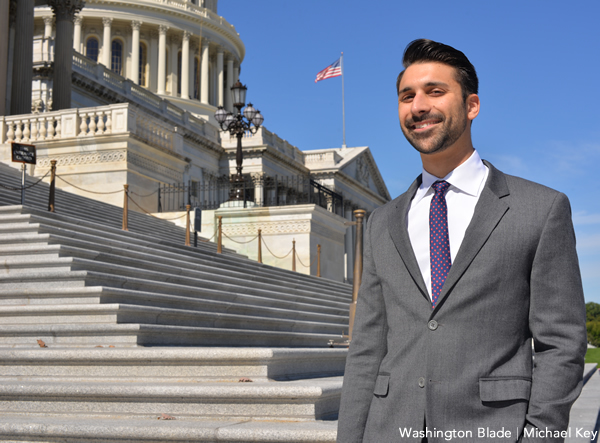
John Assini (Washington Blade photo by Michael Key)
Best Local Pro Athlete
Katie Ledecky
Five-time Olympic Gold medalist in swimming
Runner-up: Bryce Harper

Katie Ledecky (Photo by Fernando Frazao of Agencia Brasil)
Best Massage
Gary Brennan
Arlington, Va.
301-704-1158
Runner-up: Jacob Gough
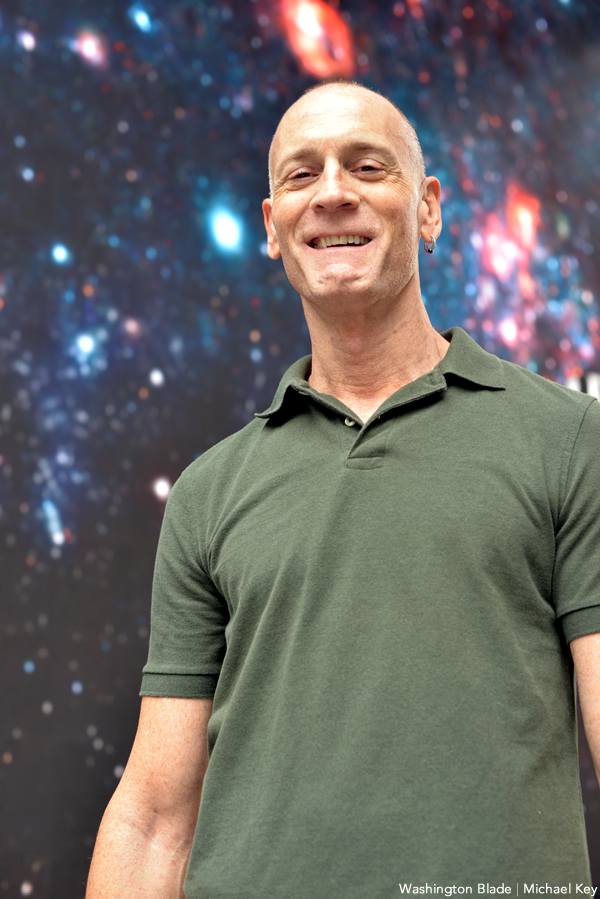
Gary Brennan (Washington Blade photo by Michael Key)
Best LGBT Bureaucrat
Sheila Alexander-Reid
Director of LGBTQ Affairs for D.C. government
Runner-up: Jack Jacobson
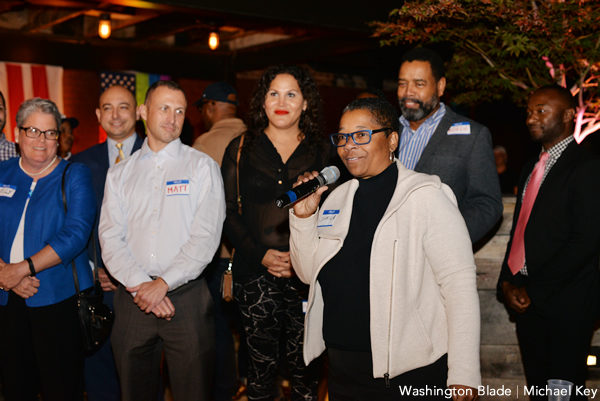
Sheila Alexander-Reid (Washington Blade photo by Michael Key)
Best Real Estate Agent
Michael Fowler, Compass
Runner-up: Jeff Taylor, Sotheby’s
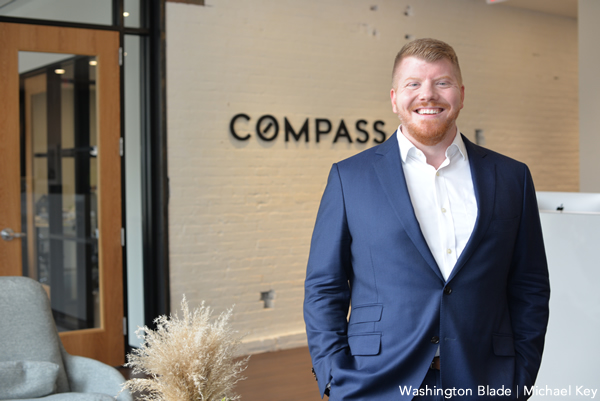
Michael Fowler (Washington Blade photo by Michael Key)
Best Real Estate Group
The Evan and Mark Team, Compass
Runner-up: Ray Gernhart and Associates Re/Max
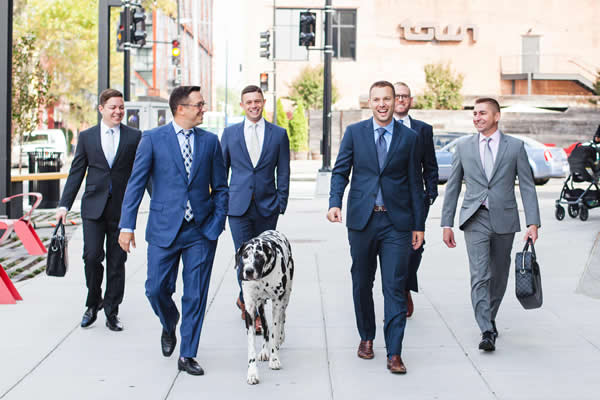
The Evan and Mark Team of Compass (Photo courtesy the Team)
Best Rehoboth Real Estate Agent
Chris Beagle
Berkshire Hathaway Gallo Realty
gotogallo.com
(Also won this category last year)
Runner-up: Jack Lingo
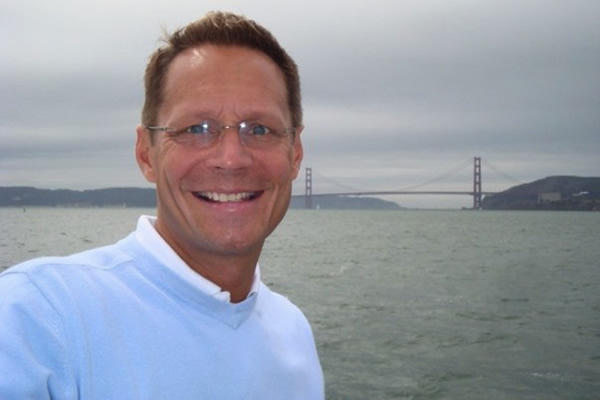
Chris Beagle (Photo courtesy of Beagle)
Best Straight Ally
Hillary Clinton
Runner-up: Leigh Ann Hendricks
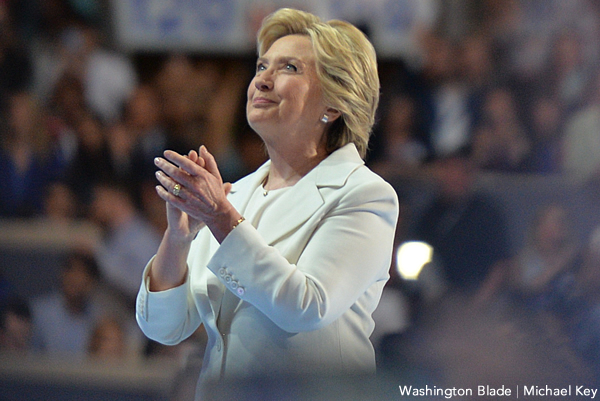
Sec. Hillary Clinton (Washington Blade photo by Michael Key)
Best Trans Advocate
Sarah McBride
Runner-up: Ruby Corado
Sarah McBride in July became the first openly transgender person to speak at a major party convention, but her advocacy efforts began long before she took to the podium at the Democratic National Convention in Philadelphia.
McBride came out as trans in 2012 when she was the student body president of American University.
The Wilmington, Del., native had been involved with Equality Delaware, a statewide LGBT advocacy group, for several years. She joined the organization’s board of directors after she came out.
McBride testified three times in support of the bill that added gender identity to Delaware’s anti-discrimination and hate crimes law. Gov. Jack Markell said after he signed the measure in 2013 that his former intern “courageously stood before the General Assembly.”
McBride made national headlines in April when she posted a picture of herself on Instagram inside a women’s bathroom in North Carolina. The state’s governor, Pat McCrory, had just signed House Bill 2, which prohibits trans people from using public restrooms that are consistent with their gender identity and bans local municipalities from enacting LGBT-inclusive nondiscrimination measures.
“Trying to pee in peace,” wrote McBride in her post. “Trying to live our lives as fully and authentically as possible. Barring me from this restroom doesn’t help anyone. And allowing me to continue to use this bathroom — just without fear of discrimination and harassment — doesn’t hurt anyone. Stop this. We are good people.”
McBride, who supports Hillary Clinton, worked at the Center for American Progress until she became a spokesperson for the Human Rights Campaign in June. She remains humble about her advocacy efforts.
“ I feel incredibly privileged to be a part of this community and this movement, especially at such an important time,” McBride says. “There are so many amazing trans advocates doing lifesaving work across the country.”
“This has been a tough year for transgender people, particularly in states like Mississippi, Texas and North Carolina, but I hope they know that there are so many people who see them, who care for them, and who are fighting to make this world a little kinder and safer for all of us.” (Michael K. Lavers)

Sarah McBride speaks at the Democratic National Convention. (Blade photo by Michael Key)
Best Stylist
Quency Valencia
Salon Quency
1534 U St., N.W.
202-930-7008
Runner-up: Ryan Payne, Bang Salon
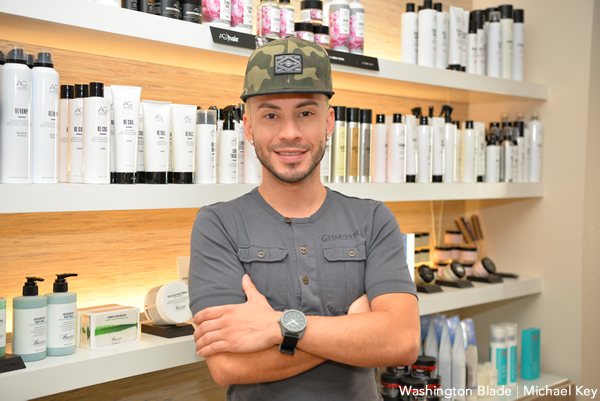
Quincy Figueroa (Washington Blade photo by Michael Key)
To see winners in other categories in the Washington Blade’s Best of Gay D.C. 2016 Awards, click here.
Travel
Manchester is vibrant tapestry of culture, history, and Pride
Alan Turning Memorial is among English city’s many attractions

Manchester, England, is not only famous for its industrial heritage, music scene, and football clubs — it’s also home to one of the most vibrant and historically significant LGBTQ communities in the U.K. Often referred to as the “gay capital of the North,” Manchester has been a pioneer in LGBTQ rights, visibility, and celebration, cultivating a culture of inclusivity that continues to thrive today.
The roots of Manchester’s LGBTQ history stretch back centuries, but it was during the 20th century that the city truly became a hub for activism and progress. In 1880, a scandal known as the “Manchester Drag Ball” brought national attention to the city when police raided a fancy dress ball attended by men in drag. Though the incident was used to stigmatize the community, it also marked one of the first widely publicized moments of queer expression in the city.
Manchester is home to several institutions that preserve and celebrate queer history. The LGBT Foundation, based in the city, is one of the U.K.’s leading LGBTQ charities, providing health and support services as well as educational resources.
The city is also immortalized in pop culture as the backdrop for “Queer as Folk,” the groundbreaking 1999 television series created by Russell T. Davies. The show, set in Manchester’s Gay Village, helped bring the realities of LGBTQ life to mainstream audiences and played a pivotal role in shaping public attitudes.
Manchester, is a city that lives and breathes resilience. It’s a place where cobblestone streets echo with the voices of industrial workers, punk rockers, activists, and proud members of the LGBTQ community. I came here seeking stories — some hidden in old libraries, others pulsing through neon-lit streets — and left with a sense of belonging I hadn’t expected.
My base for this journey was the magnificent Kimpton Clocktower Hotel. Located in a former insurance building dating back to the 1890s, it seamlessly marries historic grandeur with modern luxury. Walking through its doors felt like entering a different era. The soaring ceilings, intricate tilework, and dramatic staircases told stories of old Manchester, while the in-room record players spinning tracks by Oasis made sure I knew exactly where I was.
The heart of the hotel is The Refuge, a restaurant and bar that buzzes with energy. Whether sipping cocktails beneath the Winter Garden’s lush greenery or sharing small plates that borrow flavors from around the world, I felt immersed in the city’s welcoming vibe. Even in its luxury, the Kimpton feels like a place for everyone, especially when there is a DJ spinning some cool jazzy beats.
One thing I loved about this property is their “Forgot it? We’ve got it” service. Whether its toothpaste, a shaving kit, or phone charger, the helpful staff have you covered. I tend to forget at least one necessity on every trip. The Kimpton’s central location places guests within walking distance of Manchester’s vibrant cultural scene, including the Palace Theatre, Canal Street, and various shopping and dining options.
My first stop in Manchester was the John Rylands Library, an architectural marvel of neo-Gothic design. I was there specifically to view “The Secret Public” exhibition. It traces Manchester’s underground art scene, especially its ties to queer culture and punk resistance. Flyers, magazines, and photographs are on display.
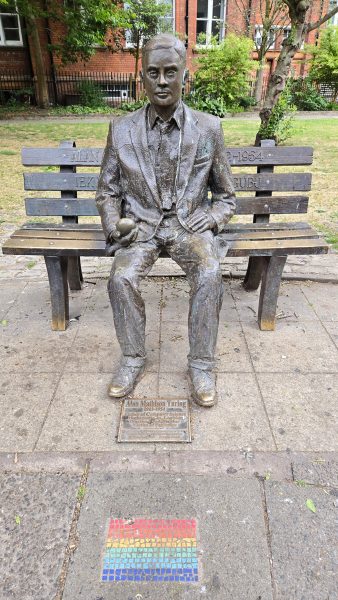
And while we are on the topic of LGBTQ history, the best way to understand Manchester’s queer roots is by talking to the locals. The Free Manchester Walking Tours offers a Queer History Tour, led by passionate guides who have in depth knowledge of the city’s LGBTQ history and culture. We began our tour in Sackville Gardens, home to the Alan Turing Memorial and the Beacon of Hope, a tribute to those affected by HIV/AIDS. It’s a space for reflection, nestled just beside Canal Street’s constant thrum. For those not familiar with Alan Turing, he was a pioneering mathematician and computer scientist, best known for his role in cracking the German Enigma code during World War II, a breakthrough that helped shorten the war and save countless lives. Often regarded as the father of modern computing, Turing laid the theoretical foundation for artificial intelligence. Despite his monumental contributions, he was persecuted for being gay, ultimately leading to his tragic death in 1954. Today, he is celebrated as both a scientific genius and a symbol of the ongoing struggle for LGBTQ rights.
No trip to Manchester would be complete without a night — or three — spent in the Gay Village. Centered around Canal Street, it’s a place that radiates warmth and freedom. What once was a hidden, underground scene in the 1980s has become a global symbol of LGBTQ pride.
During the day, you’ll find people sipping coffee along the canal and by night, the rainbow flags light up the street. Spaces like Via and the Eagle pulse with music and laughter, while Cruz 101 remains a sacred institution for dancefloor devotees. This is more than a party district; it’s a cultural hub, one that has helped shape national conversations and lead by example.
Manchester’s gay scene is more than just nightlife. In the Northern Quarter, I stumbled into Feel Good Club. a queer-owned café that quickly became one of my favorite stops during my trip. Feel Good Club is a café but the space also hosts workshops, mental wellness events, and spontaneous conversations with strangers who somehow feel like old friends. I ordered a bowl of apple-soaked oats and I have to say, it was one of the most delicious and inexpensive things I ate during my entire trip to England. I should have asked for the recipe!
A few blocks away sits Queer Lit, an LGBTQ bookstore filled to the brim with stories I wish I’d had growing up. From queer romance and fiction to books on trans identity and intersectionality, the shop is both cozy and revolutionary. Queer Lit claims to have the largest selection of LGBTQ books in all of Europe. Beyond books, the store hosts events such as workshops, live readings, and book clubs, providing a safe and inclusive space for the community to gather and celebrate queer literature. They also serve a variety of beverages. I would definitely recommend trying one of their hot chocolate drinks.
Though my trip didn’t coincide with Manchester Pride, visitors can expect tens of thousands each August. Pride here features a blend of celebration and activism. From glitter-filled marches to thoughtful panel discussions, it’s a reflection of the city itself: joyful, inclusive, and unafraid to speak truth to power. Importantly, the money raised goes straight back into the community, funding LGBTQ+ health initiatives, charities, and support services. Also in August is SCENE, Manchester’s LGBTQ+ Film and TV Festival, which consists of a week of new and classic LGBTQ cinema and TV screenings, panels, and other events.
All this touring and learning about queer history made me hungry, so for dinner, I ventured to Maray, a Middle Eastern-inspired gem in the city center. Its signature “Disco Cauliflower” — roasted whole and topped with tahini, pomegranate, and harissa — was a revelation. The food, like the city, defied expectations. It was spicy, complex and comforting. I would also recommend trying the crispy sea bass with broccoli slaw. Maray’s vibe is relaxed yet refined, a perfect place to unwind after a day of exploration. Its inclusive, welcoming spirit felt aligned with everything I’d experienced in Manchester so far.
For a more casual dining experience, head over to Freight Island, a unique food hall and entertainment venue located near Piccadilly Station. The venue features a variety of locally owned food stalls including Mia’s Arepas, Ornella’s Little Kitchen and Mega Gyros. It’s a great place to grab a quick bite or cocktail after work with friends.
Manchester may not be as polished as London, but that adds to its charm and intrigue. I tend to enjoy cities like Manchester over their larger neighbors. During my entire stay, I was able to walk to every attraction I visited and by experience, the best way to see a city is on foot. It’s also a great way to burn off those extra calories.
Whether you’re wandering Canal Street at sunset, or simply sipping hot chocolate at Queer Lit, Manchester is a place where you can be yourself and belong.
Enjoy the journey!
Books
Embracing the chaos can be part of the fun
‘Make Sure You Die Screaming’ offers many twists and turns

‘Make Sure You Die Screaming’
By Zee Carlstrom
c.2025, Random House
$28/304 pages
Sometimes, you just want to shut the door and forget what’s on the other side.
You could just wipe it from your memory, like it didn’t occur. Or create an alternate universe where bad things never happen to you and where, as in the new novel “Make Sure You Die Screaming” by Zee Carlstrom, you can pretend not to care.

Their mother called them “Holden,” but they’d stopped using that name and they hadn’t decided what to use now. What do you call an alcoholic, queer, pessimistic former ad executive who’s also “The World’s First Honest White Man,” although they no longer identify as a man? It’s a conundrum that they’ll have to figure out soon because a cop’s been following them almost since they left Chicago with Yivi, their psychic new best friend.
Until yesterday, they’d been sleeping on a futon in some lady’s basement, drinking whatever Yivi mixed, and trying not to think about Jenny. They killed Jenny, they’re sure of it. And that’s one reason why it’s prudent to freak out about the cop.
The other reason is that the car they’re driving was stolen from their ex-boyfriend who probably doesn’t know it’s gone yet.
This road trip wasn’t exactly well-planned. Their mother called, saying they were needed in Arkansas to find their father, who’d gone missing so, against their better judgment, they packed as much alcohol as Yivi could find and headed south. Their dad had always been unique, a cruel man, abusive, intractable; he suffered from PTSD, and probably another half-dozen acronyms, the doctors were never sure. They didn’t want to find him, but their mother called…
It was probably for the best; Yivi claimed that a drug dealer was chasing her, and leaving Chicago seemed like a good thing.
They wanted a drink more than anything. Except maybe not more than they wanted to escape thoughts of their old life, of Jenny and her death. And the more miles that passed, the closer they came to the end of the road.
If you think there’s a real possibility that “Make Sure You Die Screaming” might run off the rails a time or three, you’re right. It’s really out there, but not always in a bad way. Reading it, in fact, is like squatting down in a wet, stinky alley just after the trash collector has come: it’s filthy, dank, and profanity-filled. Then again, it’s also absurd and dark and philosophical, highly enjoyable but also satisfying and a little disturbing; Palahniuk-like but less metaphoric.
That’s a stew that works and author Zee Carlstrom stirs it well, with characters who are sardonic and witty while fighting the feeling that they’re unredeemable losers – which they’re not, and that becomes obvious.
You’ll see that all the way to one of the weirdest endings ever.
Readers who can withstand this book’s utter confusion by remembering that chaos is half the point will enjoy taking the road trip inside “Make Sure You Die Screaming.”
Just buckle up tight. Then shut the door, and read.
The Blade may receive commissions from qualifying purchases made via this post.

‘A Wrinkle in Time’
Through July 20
Arena Stage
1101 Sixth St., S.W.
Tickets range from $59-$209
Arenastage.org
Currently at Arena Stage, talented out actor and singer Taylor Iman Jones is rekindling an old friendship with an adored character of fiction.
Broadway vet Jones is starring as 13-year-old Meg Murry in “A Wrinkle in Time,” the world-premiere musical adaptation of Madeleine L’Engle’s same-titled book.
For many readers, especially women, the classic 1962 young adult novel, was their first foray into sci-fi, particularly one with a female protagonist.
The story centers on Meg, an awkward schoolgirl whose physicist father has mysteriously disappeared. Now, Meg, her popular friend Calvin, and smart younger brother Charles Wallace are tasked with moving through time and space to find him. Along the way they encounter adventure and evil.
For Jones, 33, playing 13-year-old Meg feels freeing in ways. She says, “As you get older, you’re told to grow up, so I like letting go of some of that. To feel feelings in their rawest form and to tap back into that is fun. I like the spontaneity. There are highs and lows to revisit.”
Born and raised in the San Francisco Bay Area, Jones began piano lessons at just six and soon added band and plays to their pursuits. Following high school, she made a deep dive into California theater for seven years before making the big move to New York in 2017 where after just two months she was singing on Broadway.
The determined and appealing Jones, who lives in New York with their partner, boasts an impressive bio. She has appeared on Broadway as Catherine Parr, Henry VIII’s sixth and final wife in Six, and in the original casts of “Head Over Heels” and “Groundhog Day.” She’s been seen in national tours of “Hamilton” and “American Idiot.”
WASHINGTON BLADE: It seems “A Wrinkle in Time” and Meg mean a lot to a lot of people.
TAYLOR IMAN JONES: The book tells the story of a girl with so much undiscovered power who’s accomplishing things she never imagined that she could.
BLADE: Can you relate?
JONES: Meg wears her emotions on her sleeve. I can certainly relate to that. I’m a Pisces. Sometimes being hyperemotional and very empathetic can feel like a burden, but as I’ve matured, I have realized that it’s not a bad quality. And it’s something I’ve learned to harness and to enjoy. I love that I can play a role like Meg in front of thousands of people.
BLADE: Was “Wrinkle in Time” a book you knew well?
JONES: Oh yeah, it’s a favorite book that lives in my heart and my mind. It’s one of the first books that taught me about the adventure of reading.
BLADE: And playing a favorite character must be a kick.
JONES: It really is.
BLADE: Meg is a big part in a big show.
JONES: This musical is huge. They’re traveling through space and meeting people on different planets. 20-person cast. 30 songs in the show. Quite the undertaking and I’m proud of us. I’m on stage for the entire musical and I sing four or five numbers.
As a mezzo soprano I guess you’d say I have the luxury of being able to do a lot of musicals that span a lot of different genres: rock musical, pop musical, and standards. “A Wrinkle in Time” is contemporary musical theater.
For me, singing is probably the least difficult part of the show. What’s harder for me is the way Meg experiences trauma; I need to be careful when I’m screaming and yelling.
BLADE: It seems mostly women have been involved in making this production happen (book by Lauren Yee; music and lyrics by Heather Christian; directed by Lee Sunday Evans; and choreography by Ani Taj.)
JONES: It’s true, the director, writer, etc., and most of our producers are all women. This doesn’t happen most of the time. For me it means new ideas and fresh energy, and pushing the limits of musical theater.
It’s also created a wonderful space in which to work. It can be more generous, and understanding. And centering the story on a young girl is something we can all relate to.
BLADE: Will “A Wrinkle in Time” resonate with queer theatergoers and their families?
JONES: I think so, especially on the heels of pride month. It’s truly a show for all ages about finding your inner strength and fighting for the things that you love; not letting evil win over the power of good, and not just for yourself but for those around you too.
-

 U.S. Supreme Court3 days ago
U.S. Supreme Court3 days agoSupreme Court to consider bans on trans athletes in school sports
-

 Out & About3 days ago
Out & About3 days agoCelebrate the Fourth of July the gay way!
-

 Virginia3 days ago
Virginia3 days agoVa. court allows conversion therapy despite law banning it
-

 Federal Government5 days ago
Federal Government5 days agoUPenn erases Lia Thomas’s records as part of settlement with White House












